Vidur Niti: First Dialogue (Verses 1–23)
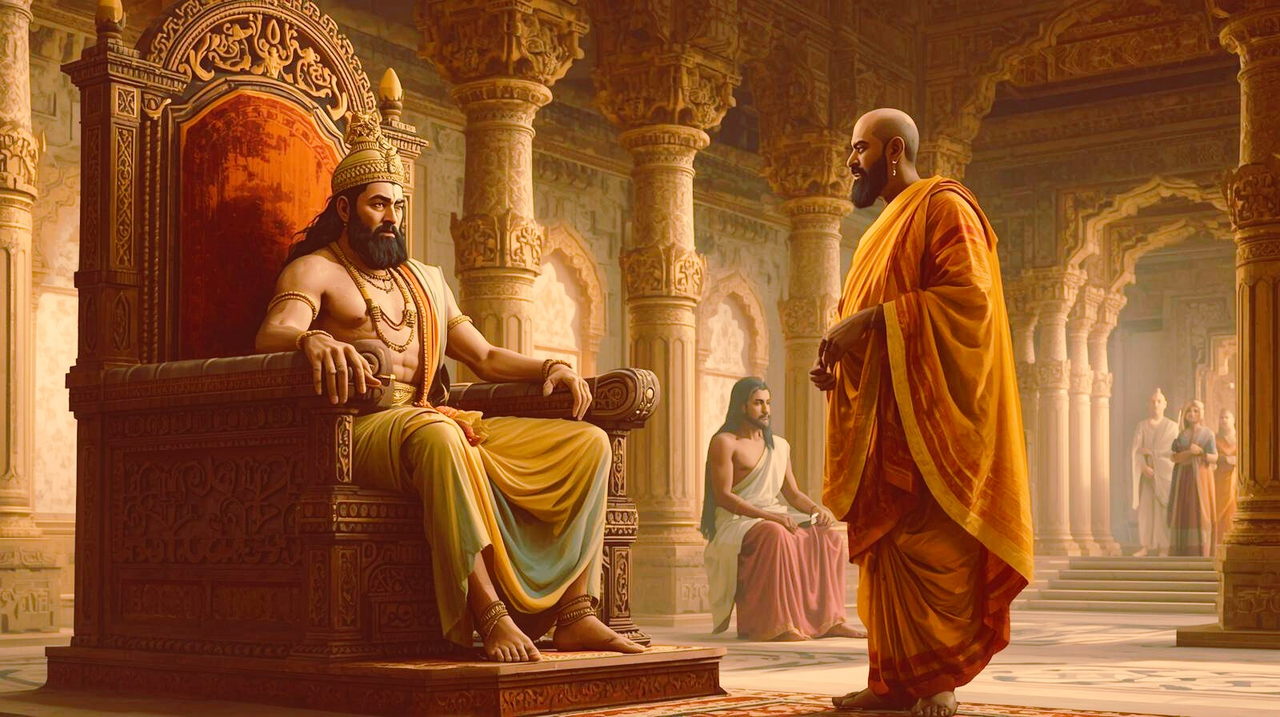
📖 Introduction
In the Mahabharata, the conversation between Vidur and King Dhritarashtra is known as Vidur Niti. This dialogue is not only about politics but also about life management and wisdom. Here is a simple English explanation of the first section (verses 1 to 23).
1. The Court Scene
King Dhritarashtra told his gatekeeper: “Call Vidur at once, I wish to speak with him on an important matter.”
The gatekeeper respectfully conveyed the message and said to Vidur: “The king is eager to meet you.”
2. Vidur’s Arrival
Vidur reached the royal palace and said to the gatekeeper: “Kindly inform the king that I am here.”
The gatekeeper went inside and said: “Maharaj, Vidur has arrived and seeks your audience.”
Dhritarashtra replied with joy: “Bring him in immediately. A wise man like Vidur should never be kept waiting.”
3. Dhritarashtra’s Worry

Vidur entered the court, bowed, and said: “Maharaj, what service can I offer you?”
Dhritarashtra replied: “Sanjay has conveyed the message of the Pandavas. After hearing his words, I could not sleep the entire night. My mind is restless. Please use your wisdom to guide me.”
4. Vidur’s Counsel
Vidur said thoughtfully: “Maharaj, first reflect—have you ever acted out of greed, taken to injustice, or seized what belongs to others? If so, the root of your worry lies there.”
Dhritarashtra answered: “Vidur, I seek your honest and best advice.”

5. The Essence of Vidur Niti (Verses 16–23)
Vidur then explained the qualities of a truly wise person:
- He performs good deeds and keeps away from evil. (16)
- Neither anger, pride, nor greed can shake him. (17)
- He keeps his plans secret and reveals them only after completion. (18)
- Heat or cold, pleasure or pain, fear or joy cannot stop him from duty. (19)
- Truth and righteousness are always his highest priority. (20)
- He works within his capacity and never underestimates anyone. (21)
- He does not grieve over what is lost and does not panic in adversity. (23)
- He never delays in action and always values time. (24)
✍️ Conclusion
This dialogue from the Mahabharata is not just Dhritarashtra’s personal guidance, but a timeless lesson for humanity. Vidur Niti teaches us that a truly wise person lives with righteousness, self-control, and respect for time.
Vidur Niti: On Wisdom and Folly (Verses 25–49)
🧠 Hallmarks of a Wise Person (Pandit)
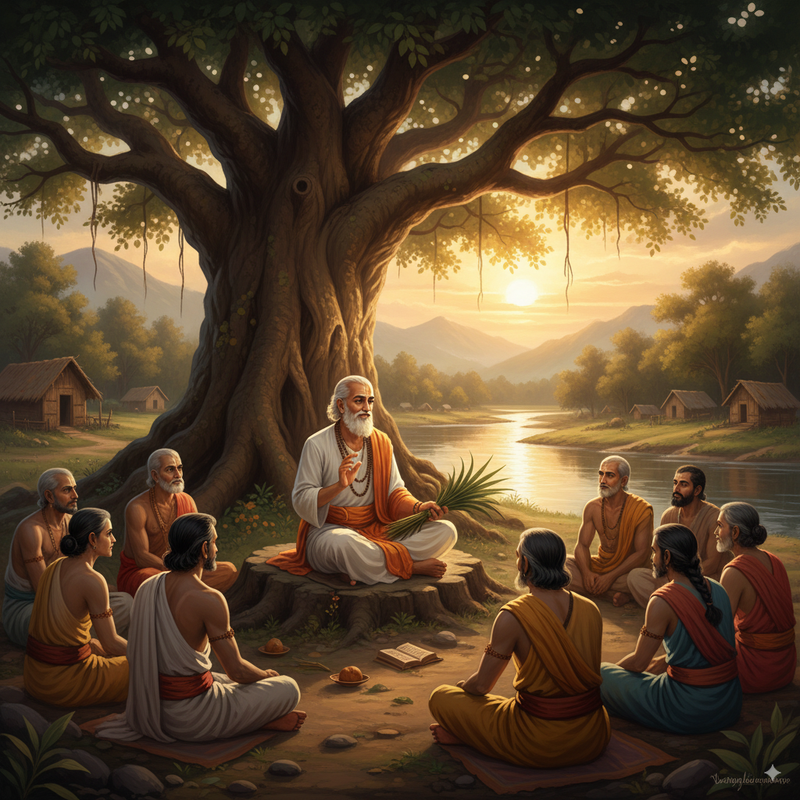
- 25. Wise people do not get jealous of others' progress.
- 26. One who remains the same in happiness and sorrow is truly wise.
- 27. One who understands the nature of every creature and the intricacies of every task is a Pandit.
- 28. A wise person is sharp in conversation, intelligent, and can explain complex things with ease.
- 29. One whose intelligence and knowledge work in harmony, preventing them from straying onto the wrong path.
🤦 Traits of a Foolish Person (Moodh)
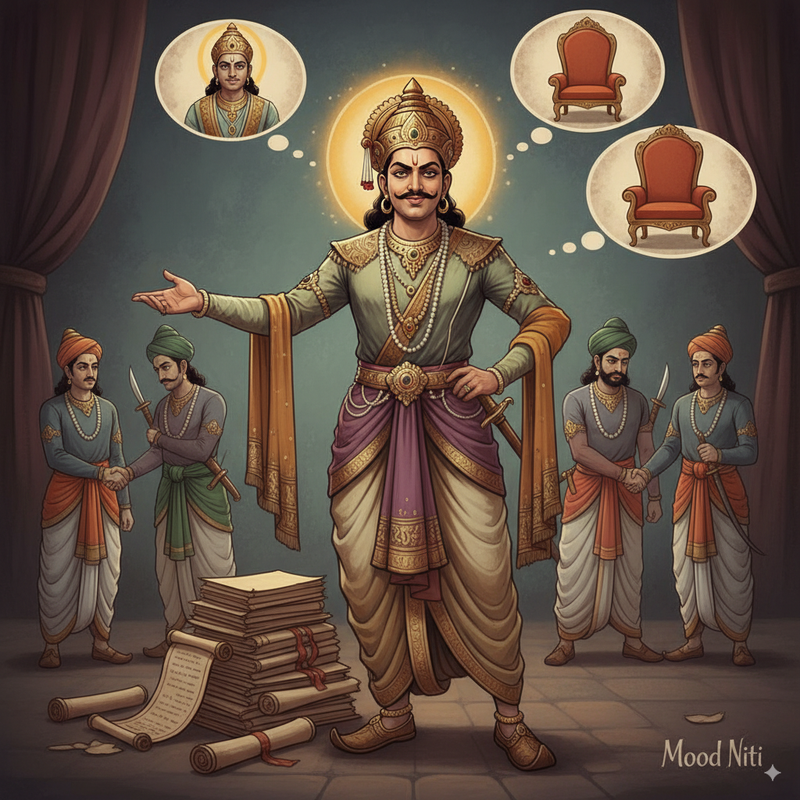
- 30. One who knows nothing but pretends to know everything, and is poor but boasts of wealth—is a fool.
- 31. One who abandons their own work to chase after others' affairs or maintains false friendships.
- 32. One who desires those who dislike them and quarrels with the powerful is a fool.
- 33. One who considers their enemy a friend and their friend an enemy.
- 34. One who constantly procrastinates and is plagued by doubt in everything.
- 35. One who interferes without being invited and speaks nonsense without being asked.
- 36. One who condemns others for faults they possess themselves.
🌱 Essential Principles for Life (Sutras)
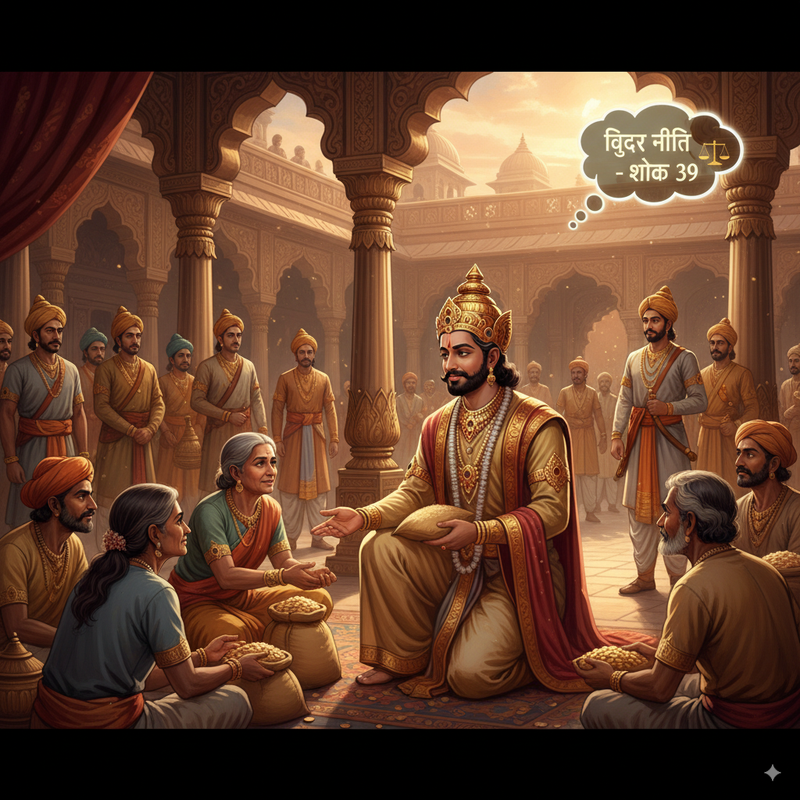
- 39. One who does not become arrogant after gaining wealth or power is a Pandit.
- 40. One who eats good food alone and doesn't share with dependents is a lowly person.
- 41. The sins of one person can bring suffering to all (like a leader's mistake affects the public).
- 43. Control your senses, and abandon lust and anger—you will find happiness.
- 46. Truth is the key to heaven, just as a boat is the key to crossing an ocean.
- 47. Forgiveness is a great virtue, but forgiving the same mistake repeatedly is a weakness.
- 48. Dharma (righteousness), forgiveness, knowledge, and non-violence—this is true happiness.
- 49. Success is not achieved without struggle and effort.
📝 Summary in Simple Words
- A wise person is calm, just, and helpful to others.
- A fool is arrogant, greedy, and walks on the wrong path.
- For success in life: Speak the truth, be forgiving, abandon bad habits, and work together.
Vidur Niti: Principles for Life & Governance (Verse 50–75)
🧭 Principles of Life

- 50. Ignoble people speak bitter words without reason.
- 52. Two thorns pierce the body deeply: the greed of the poor and the anger of the powerless.
- 53. Two kinds of people reach the heavens: a powerful person who is forgiving and a poor person who is charitable.
- 54. Giving wealth in the wrong way has two harms: giving to the unworthy and not giving to the deserving.
👑 Precautions for a King
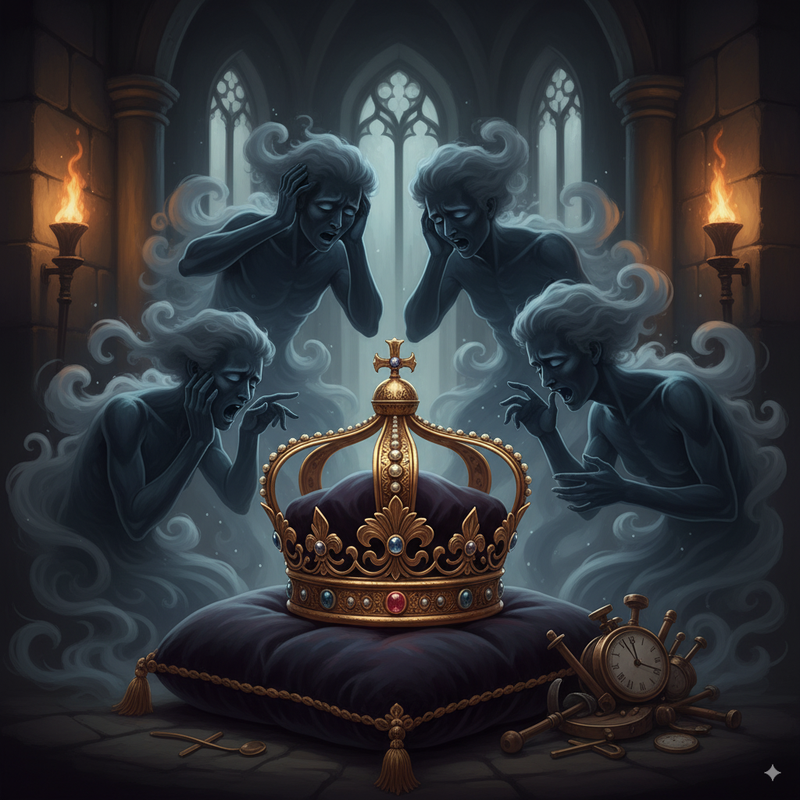
- 58. A king should never take advice from four people: the ignorant, the lazy, the procrastinator, and the flatterer.
- 59. Four people should always have a place in the home: an old relative, a friend in trouble, a poor sibling, and a childless sister.
- 73. A king must avoid seven addictions: women, gambling, hunting, alcohol, harsh speech, cruelty, and the misuse of wealth.
📜 Rules of Life & Success
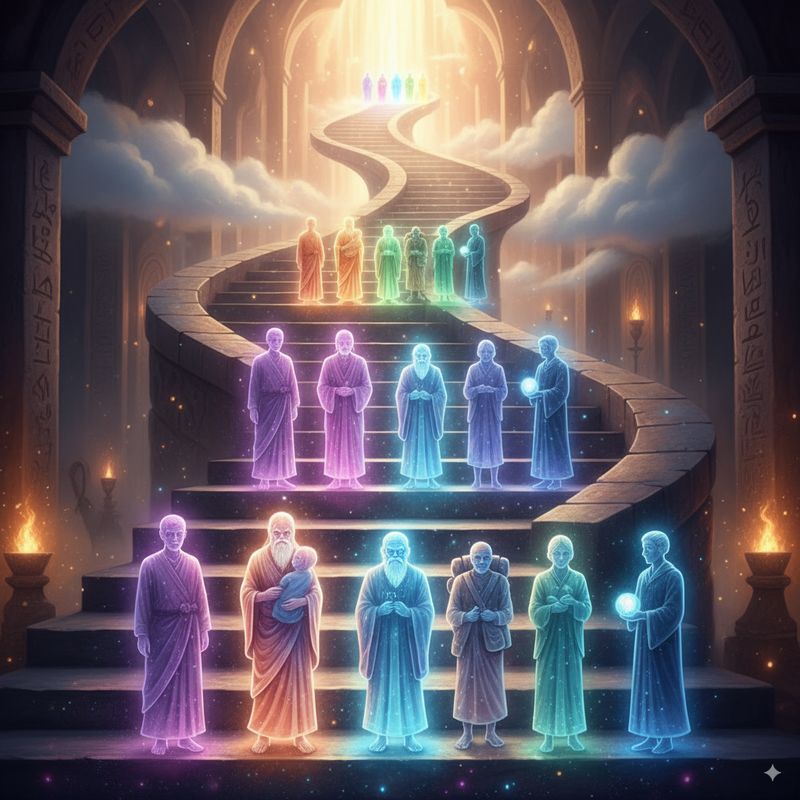
- 62. One should serve the five fires: mother, father, teacher (guru), guest, and the self.
- 65. If even one of the senses has a 'hole' (is uncontrolled), wisdom is lost like water from a leaky pot.
- 66. Six flaws hinder success: laziness, excessive sleep, fear, anger, procrastination, and indecisiveness.
- 69. Never abandon these six virtues: truthfulness, charity, diligence, non-enviousness, forgiveness, and patience.
📌 Summary
- Good People Are: Generous, forgiving, and diligent.
- Ignoble People Are: Greedy, lazy, and dependent on others.
- Mantras for Success: Control your senses, donate to the deserving, and stay away from vice.
Vidur Niti: The Art of Living (Verse 76–104)
😊 The Eight Joys of Life

- The company of good friends.
- The acquisition of wealth.
- The loving embrace of a child.
- The affection of one's spouse.
- The presence of sweet-spoken words.
- Achieving victory when contested.
- Attaining a desired object.
- Receiving respect in an assembly.
⚠️ Ten States That Obscure Dharma
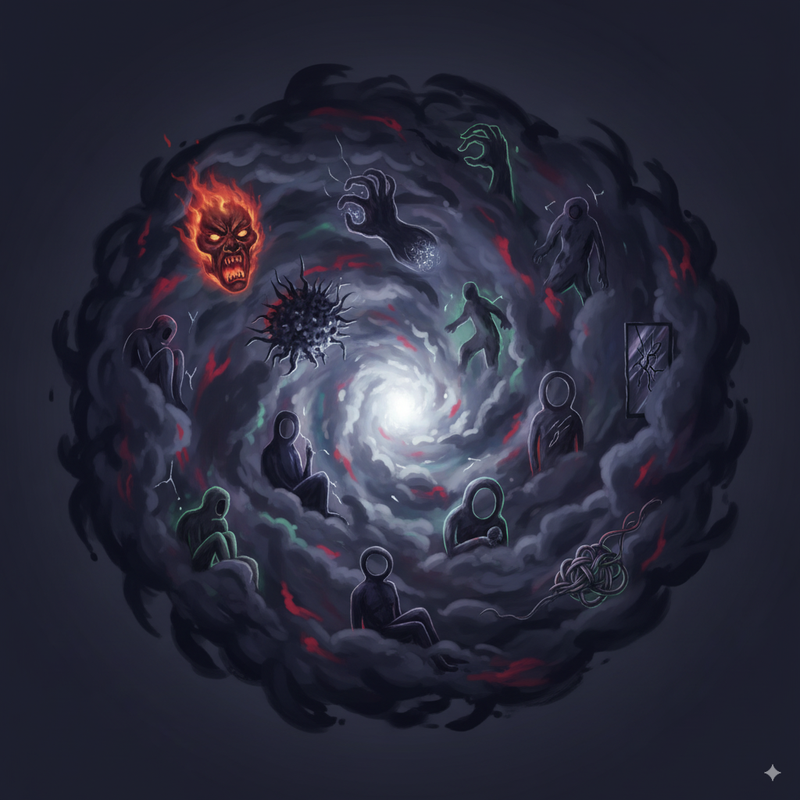 A person's sense of Dharma (righteous duty) is forgotten in these ten states:
A person's sense of Dharma (righteous duty) is forgotten in these ten states:
- Intoxication
- Carelessness
- Exhaustion
- Anger
- Hunger
- Haste
- Fear
- Greed
- Lust
- Arrogance
🌼 Principles for a Happy Life
 A happy person:
A happy person:
- Does not undertake useless journeys.
- Does not covet another's partner.
- Stays away from lies, theft, and intoxicants.
- Avoids quarreling without reason.
- Does not display pride or insult others.
- Does not speak harsh words.
- Does not rejoice in the sorrows of others.
- Never regrets giving in charity.
📜 Message for the Pandavas
103-104. O Dhritarashtra! Pandu's five sons are as brilliant as the moon, and you have raised them. You will find happiness by giving them their rightful kingdom; otherwise, both gods and men will hold you to blame.
📌 Final Summary
Vidur Niti teaches us that true happiness lies in simplicity, self-restraint, and the welfare of others.
To live a virtuous life, it is essential to control lust, anger, and greed, and to always act with justice and compassion.
Vidur Niti (Verses 1–23): Wisdom for Life and Leadership
📖 Introduction
The Mahabharata is not only a story of war but also a deep source of wisdom. One of its most important parts is the dialogue between King Dhritarashtra and Vidur, famously known as Vidur Niti. In these verses, Vidur shares timeless lessons that apply to rulers, leaders, and even ordinary people in daily life. His teachings revolve around truth, discipline, patience, balance, and the importance of right timing. These values are universal and remain as relevant today as they were thousands of years ago.
🤔 Dhritarashtra’s Worry
King Dhritarashtra, the blind ruler of Hastinapur, was deeply troubled by the rising tension between the Kauravas and the Pandavas. Restless and sleepless, he turned to Vidur, his wise minister, and said:
“O Vidur, my heart is restless with worry. You are well-versed in the principles of Dharma (righteousness) and Artha (worldly prosperity). Show me the correct path. Tell me honestly what you think about the Pandavas and our situation.”
Dhritarashtra’s words reflect the confusion of a leader who knows what is right but feels torn between family attachments and fear of consequences.
🗣️ Vidur’s Reply
Vidur, known for his calm and fearless wisdom, responded without hesitation:
“A truly wise man speaks the truth in all situations, whether it pleases or hurts, and never hides it even in silence.” (Verse 4)
“I will advise you only what is good for the Kuru dynasty: Actions taken through wrong means, even if successful, should not be trusted. Actions taken through righteous means, even if they fail, should never be abandoned.” (Verses 5–6)
Through this, Vidur makes it clear that truth and righteousness are above temporary success.
💡 Sutras of Life
1. Decision-Making (Verses 8–9)
Vidur teaches that before starting any task, one must carefully think of its consequences. Hasty decisions lead to regret, while thoughtful actions bring stability. He emphasizes that one should evaluate their own capacity—what can truly be achieved—and act accordingly.
Lesson: Wisdom lies in planning with foresight and acting within one’s ability.2. Advice for a King (Verses 10–11)
According to Vidur, a king must understand the changing nature of wealth, the needs of his subjects, and the role of punishments in maintaining order. Without this awareness, a kingdom cannot prosper. But if a ruler combines Dharma (justice) and Artha (prosperity) in governance, success naturally follows.
Lesson: Leadership demands both compassion and discipline.3. Cautionary Examples (Verses 12–13)
Vidur uses simple metaphors to explain caution: Prosperity without discipline is temporary, just as beauty fades with old age. A fish swallows a hook hidden in tasty bait because it fails to see the danger.
Lesson: Without self-control and foresight, even great success can lead to downfall.4. Importance of Right Timing (Verses 14–16)
Vidur highlights the value of timing: If food is available today, do not unnecessarily postpone eating it. Plucking unripe fruit gives neither taste nor seed. But plucking ripe fruit at the right time brings both immediate enjoyment and future benefit.
Lesson: Success in life depends not only on effort but also on patience and timing.5. Teaching of Balance (Verses 17–18)
Vidur advises balance in earning and enjoying wealth: Just as bees gather honey without harming flowers, people should earn wealth without hurting others. One should collect like a garland maker who picks flowers gently, not like a charcoal maker who destroys the whole tree.
Lesson: Sustainable prosperity comes from gentle and ethical living, not exploitation.6. Principle of Karma (Verses 19–21)
Vidur reminds Dhritarashtra that some tasks succeed effortlessly, while others fail despite hard work. The wise person chooses tasks that require little effort but yield great results and begins them without delay.
Lesson: Efficiency and timely action are greater than blind labor.7. Rules of Governance (Verses 22–23)
Finally, Vidur speaks of the qualities of a good ruler: A king who is calm, observant, and treats everyone equally earns the love of his people. A king who rules through fear drives people away. A ruler who keeps his subjects happy finds himself supported and respected by the world.
Lesson: True power comes from fairness and kindness, not fear.📌 Summary
Vidur Niti (Verses 1–23) offers practical wisdom for both rulers and common people. It teaches us:- Take decisions with careful thought and foresight.
- Never sacrifice righteousness for temporary success.
- Act at the right time; patience brings the best results.
- Earn wealth without harming others and live with balance.
- A leader must combine fairness, discipline, and compassion.
🌟 In simple words: Vidur teaches that the foundation of a happy life and a stable kingdom lies in truth, discipline, and the welfare of others.
Vidur Niti (Verses 51–78): The Ultimate Guide to Self-Mastery
⚠️ 1. The Dangers of Pride (51–53)
- The intoxication of wealth is the most dangerous—it makes a person blind right before their fall.
- A person who uses their senses without restraint becomes as miserable as a fading moon surrounded by planets.
- The troubles of one who cannot conquer their five senses will perpetually increase.
👑 2. Qualities of a Successful Ruler (54–57)
- One who does not first conquer themself can never conquer their ministers or their enemies.
- A true king is one who: Controls his senses, guides his ministers, punishes justly, and examines every decision before making it.
- The body is a chariot, the soul is the charioteer, and the senses are horses. The one who masters this chariot lives a happy and purposeful life.
🧘♂️ 3. The Power of Self-Control (58–62)
- Uncontrolled senses destroy a person, like a wild chariot in the hands of an unskilled driver.
- One who abandons Dharma (duty) and Artha (purpose) for mere sense-pleasure will ultimately lose everything.
- Victory over the self is the greatest victory. The soul can be its own best friend or its own worst enemy.
🔥 4. The Inner Enemies: Lust & Anger (63–65)
- Lust and anger are like a fishing net that traps the intellect, preventing clear judgment.
- One who acquires resources by first understanding Dharma and Artha remains happy and secure.
- First, conquer the internal enemies (lust, anger, greed, attachment, ego), and only then can you conquer external foes.
🌟 5. The Importance of Virtues & Good Company (69–72)
- A virtuous person is marked by non-enviousness, simplicity, truthfulness, contentment, sweet speech, and restraint.
- Even the weak have strengths: violence for the wicked, law for the ruler, service for women, and forgiveness for the virtuous.
- Avoid the company of wicked people, for they will destroy you, just as a piece of dry wood burns the wet wood it touches.
🗣️ 6. The Supreme Restraint of Speech (73–78)
- Controlling one's words is the most difficult duty of all.
- Good words bring welfare and prosperity; harsh words bring disaster and ruin.
- Arrows of words penetrate the heart. Physical wounds may heal, but wounds inflicted by speech never do.
- When the gods wish to destroy a person, they first take away their intelligence and clarity of thought.
📌 The Ultimate Lesson
- Victory over the senses is the greatest success in life.
- A leader must first master themself before attempting to lead others.
- Never underestimate the power of your words; they can build or destroy worlds.
- External success is meaningless without victory over your internal enemies.
Vidur Niti (Verses 79–14): Simplicity vs. Pride
🚫 Dhritarashtra's Flawed Policy (79–83)
79. "O King! This unjust thought of hatred towards the Pandavas does not leave your heart."
80. "Your intellect has turned hostile towards the Pandavas due to the blind love for your own sons."
81–83. "Yudhishthira is illustrious, knowledgeable in Dharma, and compassionate—he is fit to be the king of the three worlds, yet he suffers only to uphold your honor."
🗣️ Vidura's Counsel on Simplicity (Chapter 35, Verses 2–4)
When Dhritarashtra expressed his thirst to hear more, Vidura replied:
2. "Bathing in all holy places is virtuous, but behaving with simplicity (Arjava) towards all creatures is the highest virtue of them all."
3. "O King! Be simple and just towards your sons and the sons of Pandu. This will bring you fame in this world and heaven in the next."
4. "As long as a person's name is associated with virtue, they remain revered even in the heavens."
📚 The Instructive Story of Keshi & Virochana (5–14)
Vidura shares a story to illustrate his point. Keshi, a woman, asked Virochana, the demon king, who was superior—Brahmins or demons.
Virochana (arrogantly):
7. "We, the sons of Prajapati, are superior! The gods and Brahmins are nothing before us."
Keshi challenged him to settle the matter with the sage Sudhanva. The next day, when Sudhanva arrived, the following dialogue took place:
Sudhanva to Virochana:
10. "I do not consider it proper to share this seat with you."
Virochana, trying to buy respect:
12. "I possess gold, cows, and horses—show me respect in exchange for these!"
Sudhanva's powerful reply:
13. "Let your wealth remain with you. I speak only of the supremacy of knowledge and austerity."
📌 Summary & Key Lessons
- Simplicity (Arjava) is the greatest Dharma, superior even to all pilgrimages.
- Ego and pride degrade a person, as seen in the demon king Virochana.
- True respect is earned through knowledge and virtue, not bought with wealth.
- Justice and impartiality, especially within the family, are paramount for a leader.
"A person who is partial towards his own children ultimately destroys them and himself."
– Vidura Niti
Vidur Niti (Verses 15–35): The Power of Truth
🧠 Prahlad–Sudhanva Dialogue (15–31)
The story continues with a terrified Virochana seeking a just judge. Sudhanva advises him to go to his own father, Prahlad, whose commitment to truth is absolute.
When they arrive, Prahlad asks his son why he is quarreling with a sage. After hearing the story, Prahlad prepares to judge.
To emphasize the gravity of the judgment, Sudhanva describes the terrible fate of a liar:
24. "A liar suffers a miserable night, tormented as if insulted by his wife, defeated in gambling, starving, or surrounded by enemies."
27. "Untruth first destroys the liar's animals, then his children, and finally, his own self. A single lie can lay waste to everything."
Understanding the supreme importance of truth, Prahlad delivers his verdict:
28–29. "Sudhanva is superior to you, O Virochana! His father, Angiras, is superior to me. Therefore, your life is now in Sudhanva's hands."
Pleased with Prahlad’s adherence to Dharma, Sudhanva spares Virochana.
📜 Teachings of Vidura (32–35)
Drawing from this powerful story, Vidura delivers his final, direct advice to Dhritarashtra:
32. "O King! Do not abandon righteousness for the sake of the entire earth, let alone for your son. Do not commit Adharma."
33–34. "The gods do not protect people with sticks like herdsmen. Instead, they grant wisdom to those they wish to protect. All endeavors of a person focused on universal welfare are successfully accomplished."
35. "Just as a bird abandons a nest devoid of fruit, the Vedas, too, ultimately abandon a deceptive person. Alcohol, quarrels, and division within a clan are the certain causes of destruction."
🔑 Main Teachings
- 🔹 Power of Truth: Never resort to lying, even when your life is at stake. Truth is the ultimate protector.
- 🔹 Basis of Justice: An unbiased decision, even against one's own son, is the highest Dharma (as exemplified by Prahlad).
- 🔹 Family Harmony: Do not commit injustice out of blind love for your children (a direct message for Dhritarashtra).
- 🔹 Self-Control: Avoid intoxicants, quarrels, and ego, as they are the roots of all destruction.
"Truth is the only force that supports you even after death."
– Sudhanva Rishi
Vidur Niti (Verses 36–64): The Pillars of Life
🔹 Eight Pillars of Prosperity (44–46)
Vidura explains that true and lasting prosperity is built upon eight essential pillars:
- Origin from enthusiasm
- Development from talent and skill
- Roots from efficiency and planning
- Stability from self-restraint
- Reputation from good conduct
- Expansion from service to others
- Strength from organization and unity
- Respect from the king (or leader) highlighting these qualities
🔹 Eight Doors to Heaven on Earth (47–49)
These eight virtues open the doors to a heavenly life while on Earth:
- Yagya (Sacrifice/Contribution)
- Charity
- Study and Learning
- Penance (Austerity)
- Self-Restraint
- Truth
- Simplicity
- Kindness and Compassion
🔹 Formulas for Life Management (57–60)
Vidura provides a simple yet profound formula for a happy life and afterlife:
- Perform such deeds throughout the day that your night is spent in peaceful sleep.
- Perform such deeds in your youth that your old age is spent in happiness.
- Perform such deeds throughout your life that you attain happiness even after death.
🔹 Suvarnapushpa Prithvi - Golden Flowers of the Earth (64)
Vidura concludes with a beautiful metaphor, stating that three kinds of people pluck "golden flowers" (true happiness and success) from this earth:
- The Brave Warrior: Who protects Dharma and the people.
- The Scholar: Who possesses and shares knowledge.
- The One Who Serves: Who knows the art of selfless service.
This highlights that service is as honorable and vital as bravery and knowledge.
🌟 Basic Message
- Character is Real Capital: Your identity is defined by your values, not your wealth.
- The Law of Karma: Your actions, whether virtuous or sinful, will inevitably bear fruit.
- Effective Time Management: The deeds you do today are the foundation of your happiness tomorrow.
- A Ruler's Dharma: Just and righteous governance is the true path to greatness and heaven.
Vidur Niti (Verses 64–20): Wisdom on Company, Speech & Character
🔹 Three Types of Successful People (64–65)
- A brave warrior, a learned scholar, and a person skilled in service—these three pluck the 'golden flowers' of happiness and prosperity from the earth.
- A deed guided by intelligence is always the best. An action based on mere physical strength is considered of a lower grade.
🔹 The Three Types of Men (16–20)
Vidura categorizes men based on their character:
- Uttam (Superior): Truthful, gentle-natured, self-restrained, and a well-wisher to all beings.
- Madhyam (Middling): One who keeps his word and can differentiate between right and wrong.
- Adham (Inferior): Violent, ungrateful, distrustful, and one who abandons friends in need.
🔹 The Importance of Company (13, 20)
Vidura stresses that our character is shaped by the people we associate with.
"You become like the company you keep."
His advice is simple and profound:
- Always keep the company of good and noble people (Uttam).
- Interact with mediocre people (Madhyam) only as needed.
- Maintain a complete distance from the wicked (Adham).
🔹 Dialogue on the Power of Speech (1–12)
In a dialogue, a Swan-like Maharishi explains to the Sadhya gods the secrets of his wisdom:
- Practice patience, peace, truth, and Dharma.
- Remain balanced in pleasure and pain, and keep the mind under control.
- Never speak harsh words in anger, for they burn a person to their very bones.
🌟 Main Teachings
- Service is Power: Selfless service is as important and rewarding as bravery and knowledge.
- Control Your Words: Mastery over speech is one of the greatest strengths a person can possess.
- The Effect of Company: One who associates with gentlemen inevitably becomes a gentleman themself.
- The Mark of a Good Person: Truthfulness, gentleness, and self-restraint are the defining traits of a superior individual.
"Bitter words hurt more than arrows—they create wounds in the heart that never heal."
– (Essence of Verse 8)
Vidur Niti (Verses 21-46) - Simple Summary
1. Identification of a High Clan (21–29)
Seven qualities that make a clan great:
- Penance
- Sense control
- Knowledge of the Vedas
- Holy marriage
- Regular food donation
- Religious livelihood
- Truthfulness
A clan falls when:
- The Vedas are neglected
- Brahmins are insulted
- A Guru's wealth is stolen
Essence: "A clan is identified not by wealth, but by conduct."
"A poor but virtuous clan is better than a rich and immoral one."
2. Ways to Protect the Family (30–34)
Forbidden deeds: Enmity, theft, betrayal of a friend, insulting a guest
Four holy things that are always present in the house of a gentleman:
- Grass (for a guest's seat)
- Land (for donation)
- Water (drinking water)
- Sweet speech
3. Rules of Friendship (35–41)
- A true friend is one who can be trusted like a father (35).
- Vultures do not eat an ungrateful person even when he dies (40).
- The real test of friendship is in times of crisis (41).
“Whether you have money or not—test your friend to know his truth.”
4. Ways to Peace of Mind (42–46)
Four Harms of Worry (42):
- Destroys beauty
- Decreases strength
- Kills knowledge
- Causes disease
Philosophy of Life:
“Birth and death, gain and loss, happiness and sorrow are part of life. A wise man is neither overjoyed nor overly sad.”
Sense Control: “The mind is restless—like water continuously dripping from a pot with holes.” (46)
🌟 Major Teachings:
- The greatness of a family is not due to wealth, but due to its values.
- Betrayal in friendship is the biggest sin.
- Worry destroys the body, mind, and intellect.
- Taking happiness and sorrow in a balanced manner is the key to life.
“Only truth and self-control protect the family, not storehouses of gold.”
Vidur Niti (Verses 47-72) - Simple Summary
1. Dhritarashtra's Concern (47–48)
Dhritarashtra says:
"I encouraged my foolish sons. Now they will destroy everything through war. My mind is restless—O Vidur! Show me the path to peace."
2. Sutras of Peace (49–55)
Vidur replies:
The Four Pillars of Peace:
- Learning and penance remove fear
- Sense control leads to greatness
- Knowledge is gained by serving the Guru
- Sacrifice leads to peace
The Path to Salvation:
"Those who do not depend on charity and the merits of the Vedas, who are free from attachment and hatred—they alone attain salvation."
3. Importance of Unity (53–63)
The ill-effects of division: No sleep, no religion, no happiness, no respect
Similes of unity:
- The fibers (threads) burn when scattered; they give light when together
- A grove of trees survives a storm, a single tree falls
- Lotus flowers adorn the pond only when they are together
4. The Protectors of Society (64–65)
Those who should never be killed: Brahmin, cow, woman, child, refugee, food provider
True wealth:
"A healthy body is the greatest wealth - a sick person is like a dead person."
5. Last Warning to Dhritarashtra (66–72)
The poison of anger:
"Just as a sick person cannot eat sweet fruits, an angry person cannot enjoy happiness."
Remembrance of an old mistake:
"My words were ignored when Draupadi was lost in gambling. Now is the time to mend our ways."
Final advice:
"Bring unity between the Kauravas and Pandavas. Stop Duryodhana. Harshness brings destruction - gentleness is the solution."
🌟 Core Message:
- Foundation of peace - Self-control, knowledge, and sacrifice
- Power of unity - Division is the path to destruction
- Social responsibility - Protecting the weak is Dharma
- Control over anger - It destroys both happiness and wisdom
"Just as a single tree falls in a storm, a single person cannot face the enemies." — (Excerpt from Verses 60–62)
🌿 1. Manu's 17 Nitis (1–7)
- Teaching the unworthy
- Getting angry unnecessarily
- Keeping too much contact with the enemy
- Ignoring the woman
- Not giving when asked but boasting about charity
- Doing wrong things out of arrogance
- Being weak and having enmity with the powerful
"Treat a person the way you treat him - with a trickster with deceit, with a gentleman with gentlemanliness."
Vidur Niti (Verse 1–23) - Simple Summary
1. Manu's 17 Nitis (1–7)
- Teaching the unworthy
- Getting angry unnecessarily
- Keeping too much contact with the enemy
- Ignoring the woman
- Not giving when asked but boasting about charity
- Doing wrong things out of arrogance
- Being weak and having enmity with the powerful
"Treat a person the way you treat him - with a trickster with deceit, with a gentleman with gentlemanliness."
2. 6 Reasons That Reduce Lifespan (8–10)
Dhritarashtra's question: "The age of a man is stated to be 100 years in the Vedas, then why do people live less?"
Vidur's answer:
- Extremism (debate)
- Ego
- Excessive sacrifice
- Anger
- Excessive curiosity
- Betrayal of a friend
"These cut down lifespan like sharp swords, destroy before death."
3. 5 Great Sinners (11–12)
- Guru's wife
- Killing a refugee
- Usurping a Brahmin's wealth
- Relationship with a Shudra woman
- Selling intoxicants
"All these are as sinful as killing a brahmin."
4. Characteristics of an Ideal Householder (13)
- Charitable
- Sweet-spoken
- Hospitable to guests
- Non-violent
- Grateful
- Truthful
"Such a householder attains heaven."
5. Principles of Politics (14–17)
- Speaking harsh truth is the most difficult.
- Duty of the king: Speak even unpleasant truths.
- Principle of Sacrifice:
- Sacrifice the village for the person
- Country for the village
- Everything for the country
6. Warning to Dhritarashtra (18–19)
"O Vaichitravirya! You chose crows and abandoned peacocks. You raised jackals instead of lions - now you will regret it!"
7. Servant Management (20–23)
- A good servant should work in the interest of the master.
- Work according to his ability.
- Do not abandon the master even in times of crisis.
"Servants have unwavering faith in the master who does not get angry."
Vidur Niti (Shloka 24-51) - Simple Summary
1. Rules for Servant Selection (24-25)
- Discarded servant: One who does not obey, makes excuses, is arrogant and argumentative.
- 8 qualities of an ideal messenger: Humility, efficiency, kindness, honesty, healthy, sweet-spoken, trustworthy, generous thoughts.
2. Formulas for Personal Safety (26-28)
- Never do: Standing alone at crossroads at night, desiring another's wife, lying in the royal court.
- Disapproved person: Widow sister-in-law, woman with a child, hateful king, prostitute.
3. Feminine Qualities (29)
10 ideal qualities: Beauty, sweet voice, cleanliness, fragrance, bathing ability, softness, strength, pleasure of touch, makeup art, high nobility.
4. Do Not Keep in the House (31-33)
- Unworthy person: Lazy, overindulgent, cruel, ungrateful, miser, liar.
- 6 Naradham (Lowest of Men): Ruthless, hostile, arrogant, uneducated, unrighteous, Evildoers.
5. Principles of Politics (34-37)
- Helpers and kings are bound to each other.
- Basis of governance: Welfare of all beings, intelligence and brilliance, entrepreneurship.
“By being hostile towards the Pandavas, you are making even the gods unhappy.”
6. Balance of Nature (41-42)
Forest and tiger: complement each other.
“There is no tiger without a forest, there is no forest without a tiger.”
7. Success Formulas (44-47)
- Trivarga Siddhi (Achievement of the three aims): First Dharma (righteousness), then Artha (wealth), finally Kama (desire).
- Self-restraint: Control over anger and joy, patience in adversity.
8. Five Types of Power (48-51)
- Brahmabal (low rank)
- Mantribal (advisor)
- Dhanyabal (wealth)
- Patrikabal (hereditary power)
- Prajnabal (supreme - intellect)
Vidur Niti (Shloka 52-16) - Simple Summary
1. Teaching to be Cautious (52-54)
Caution towards the enemy:
“Keep away from the person who can be harmful to you, even if he is far away.”
Unreliable 6:
- Women
- Kings
- People studying
- Enemy servants
- Pleasure-seekers
- People in the last stage of life
Arrow of wisdom:
“There is no cure for the wound caused by the arrow of wisdom - neither medicine, nor mantra, nor yajna.”
2. Mistake of not Understanding Brilliant People (55-60)
4 Very brilliant:
- Snake
- Fire
- Lion
- Son of a noble person
Simile of fire:
“Just as fire hidden in wood remains calm, similarly noble people are forgiving, but when they appear, they burn everything.”
Message for Pandavas:
“O King! You (Kauravas) are trees and Pandavas are creepers. Creepers cannot grow without trees, but trees also remain green because of creepers.”
3. Rules of Hospitality (1-5)
5 steps of hospitality:
- Welcome while standing
- Offer a seat
- Wash feet
- Ask about well-being
- Serve food
Condemnable guest:
“The life of one who drinks water without mantra-purifying water out of greed, fear or selfishness is useless.”
4. Prohibited Professions (4-5)
9 Unrighteous professions:
- Doctor (unqualified)
- Surgeon
- Womanizer
- Liquor seller
- Person who kills fetus
- Soldier
- Seller of Vedas
- One who insults guests
- Trader of salt etc.
5. Grihastha Dharma (6-16)
Characteristics of an ideal householder:
- Equal respect for gold and mud
- Equal in criticism and praise
- Away from treaty and conflict
Ethics regarding women:
“Women are the goddess of wealth of the house – protect them especially, but do not be under their control.”
Sutras of politics:
“Make mantras (secret plans) at a place where there is no one – mountain, palace or forest.”
Basic Message:
- Vigilance: Never underestimate the enemy
- Balance of relations: Kauravas and Pandavas complement each other
- Hospitality Dharma: Treat guests like gods
- Secrecy: Keep mantras secret in politics
“Just as fire hidden in wood remains invisible, similarly the brilliance of an intelligent person is omnipresent even when it remains calm.”
(Essence of verses 56-58)
Vidur Niti (Shloka 17) - Rules of Confidential Discussion
📘 Rules of Mantrana (Confidential Discussion)
Proper Place:
“Make Mantrana (confidential planning) only in three places:”
- 🌲 Jungle (solitude)
- 🚫 Shalakaarheet place (where there is no hole/hiding place)
- 🏯 Secret room of the palace
This emphasizes the need for absolute privacy and security when discussing sensitive matters to prevent eavesdropping or leakage of information.
Do Not Tell Unworthy People:
“Even if he is your dear friend, but if he…”
- 📕 Apandit (fool)
- ⚠️ Anaatmavan (incontinent/unreliable)
“…then never tell him the secret plan.”
Vidur warns against sharing secrets with those who lack wisdom or self-control, regardless of personal affection, as they are prone to blunders or uncontrollable actions that could expose the plan.
🧠 Essence of Learning:
Golden Rule of Politics:
“Share confidential things only with trustworthy, intelligent and self-controlled persons. Telling a fool or incontinent friend in an emotional state can lead to destruction.”
This highlights the critical importance of discernment in choosing confidantes. Secrecy and reliability of individuals are paramount for the success of any strategic undertaking.
📜 Ancient Example:
“Just as Duryodhana invited great destruction by revealing his plans to Shakuni (the clever but unreliable).”
This historical reference from the Mahabharata serves as a potent warning about the consequences of entrusting secrets to those who, despite being shrewd, lack true integrity or self-interest aligned with your own.
“A king’s mantra should be like the edge of his sword – the more secret, the more effective.”
Vidur Niti (Shlokas 18–42) - Simple Summary
🔐 1. Principles of Politics (18–24)
- Mantra Raksha (Protection of Secrets) and Arthlipsa (Desire for Wealth) are the pillars of the state.
- Secret plans should be told only to trusted councilors.
- One who does wrong deeds loses his life.
- Only one who knows Shadgunya (6 political qualities) is a true ruler.
These shlokas emphasize that a stable and prosperous state relies on strategic secrecy, careful financial management, righteous actions, and leadership well-versed in the six qualities of statesmanship.
👑 2. Qualities of a Ruler (22–27)
5 characteristics of an ideal king:
- Knowledge of place, growth and decay
- Control over anger and happiness
- Ability to take decisions on one's own
- Respect for Brahmins
- Never spare the enemy
An ideal ruler possesses foresight, emotional intelligence, independence in decision-making, respects learned individuals, and is resolute against adversaries to ensure the well-being and security of the kingdom.
🧘♂️ 3. Personal Policy (28–37)
6 people to be avoided:
- Company of fools
- Ungrateful (ungrateful)
- Shameless person
- Evil soul
- One who shows anger to the innocent
- Women-engaged in gambling
Vidur advises against associating with individuals who lack wisdom, gratitude, shame, or who are malevolent, prone to unjustified anger, or indulge in detrimental vices like gambling, as their company can lead to one's downfall.
7 Samidhas (means of prosperity):
- Patience
- Peace
- Restraint
- Purity
- Kindness
- Sweet speech
- Loyalty to friends
These seven qualities are presented as the essential ingredients for personal and collective well-being, fostering a virtuous and harmonious life.
⚠️ 4. Social Warning (38–42)
Three signs of downfall:
- Where women rule
- Where gamblers are influential
- Where children take decisions
“Such a country sinks like a stone boat.”
This section warns about societal structures where women hold absolute power (implying lack of balanced counsel), gambling is rampant, and immature individuals make critical decisions, leading to inevitable destruction.
🌟 Condemnable Praise:
“A person who is praised by gamblers, bards and prostitutes is like a dead person even when he is alive.”
Praise from those engaged in morally questionable professions or activities is presented as a sign of a person's degraded character, indicating that they have lost their true worth.
Vidur Niti (Shlokas 43–22) – Simple Summary
⚔️ 1. The Consequences of Dhritarashtra’s Mistake (43–44)
Vidur warns:
“You have made Duryodhana arrogant by giving him excessive wealth. Just like the demon king Bali fell from the three worlds, Duryodhana’s downfall is certain.”
Vidur directly confronts Dhritarashtra, cautioning him that his blind affection and unchecked gifting of wealth to Duryodhana have fostered arrogance, which will inevitably lead to Duryodhana's destruction, paralleling the fall of the powerful demon king Bali.
🕰️ 2. Dialogue on Destiny (1–3)
Dhritarashtra:
“Man is like a puppet in the hands of a sutradhar – tied to the hands of fate.”
Dhritarashtra expresses a fatalistic view, believing human actions are predetermined by destiny.
Vidur:
“Advice given before time (even by Brihaspati) is disobeyed.”
Vidur counters, suggesting that while destiny plays a role, the timing of advice is crucial; even the wisest counsel, if given at an inappropriate time, will be ignored.
3 ways to become dear:
- Giving charity
- Speaking sweetly
- Connecting with the root force (true friendship)
These are the means by which one can earn affection and goodwill from others.
🔍 3. Formulas of Person Evaluation (4–9)
True loss:
That which causes more harm than benefit (like following Duryodhana).
Wealth vs. virtue:
“Stay away from the qualityless rich, support the quality poor.”
This emphasizes that character and virtue are more valuable than mere wealth; one should align with the virtuous, regardless of their financial status.
Characteristics of the wicked:
- Indulge in backbiting
- Happy in others’ misery
- Always causing disputes
These traits serve as clear indicators to identify and avoid malicious individuals.
👨👩👧👦 4. Gyaati Dharma (Duty of Relatives) (15–22)
Duty of relatives:
- Help a poor/sick relative
- Eat together
- Keep sweet conversation
“Relatives are the ones who drown and save you – don’t be hostile towards them.”
Vidur highlights the dual nature of familial ties; relatives can be a source of support or conflict, hence the importance of maintaining harmonious relationships.
Appeal to the Pandavas:
“O King! Give some villages to the Pandavas. This will increase your fame and protect your clan.”
Vidur urges Dhritarashtra to appease the Pandavas by granting them their rightful share, emphasizing that such an act would bring honor and preserve the unity of the Kuru clan.
🧠 5. Practical Life Sutra (10–14)
5 Signs of trouble:
- Company of fault-finding people
- Fear of lending or taking money
- Bad reputation
- Unrest over small mistakes
- Company of mean people
“A prudent man must avoid the company of such people.”
These are practical warnings to identify and steer clear of situations and associations that lead to difficulties and loss of peace.
Vidur Niti (Shlokas 23–51) - Simple Summary
🧭 1. Be Virtuous, Respect the Pandavas (23–26)
- Suvritta (virtuous) people rescue you in trouble, Durvritta (evil) drowns you.
“O King! Be virtuous and respect the Pandavas. This will make you invincible.”
“The one who makes the people of his own clan unhappy, roams around with poison in his hands.”
Vidur advises Dhritarashtra to embrace virtuous conduct and show respect to the Pandavas, emphasizing that this path leads to strength and invincibility, while causing discord within one's own kin is self-destructive.
🕰️ 2. Avoid Repentance, Improve in Time (27–31)
“Don’t do the deed in the beginning which you will regret later. Life is uncertain.”
Atonement for Duryodhan’s sin:
“O King! Being the elder of the clan, you should correct the misdeeds of Duryodhan. Give the Pandavas their rights, so that you can be free from sins.”
This section urges foresight in actions to prevent future regret and calls upon Dhritarashtra, as the patriarch, to intervene and rectify Duryodhana's wrongdoings by restoring the Pandavas' rightful share, thereby absolving himself of sin.
💡 3. Personality Development Formulas (32–39)
5 qualities that prevent destruction:
- Humility (discipline) – removes chaos.
- Courage – prevents disaster.
- Forgiveness – calms anger.
- Good conduct – removes inauspicious signs.
- Respect for friends – increases life span.
These virtues are presented as essential for personal stability, resilience, and a long, harmonious life.
Rules for friend selection:
- Unworthy friend: Foolish, arrogant, ruthless, irreligious
- Ideal friend: Grateful, religious, truthful, self-controlled
Vidur provides clear guidelines for choosing companions, distinguishing between those who will lead to downfall and those who will support and uplift.
🏆 4. Principles of Success (40–47)
Forgiveness is the best power:
“A powerful person forgives for religion, a weak person forgives out of compulsion.”
True strength, according to Vidur, lies in the ability to forgive out of principle and righteousness, not out of helplessness.
Right use of wealth and pleasure:
“Enjoy the pleasure that is not against religion and wealth. Don’t wander like a fool.”
This emphasizes a balanced approach to life, where enjoyment and material pursuits are aligned with Dharma (righteousness) and Artha (purposeful wealth), avoiding reckless indulgence.
Where does Lakshmi not stay?
With a sad, atheist, lazy and a person without enthusiasm.
Prosperity (Lakshmi) avoids those who are melancholic, non-believing, indolent, and lacking in zeal.
🌱 5. Fruits of Life (48–51)
- Fruit of Vedas: Yajna (Agnihotra)
- Fruit of morality: Happy life
- Fruit of wife: Love and children
- Fruit of wealth: Charity and enjoyment
These shlokas outline the ultimate benefits and purposes derived from various aspects of life when pursued righteously.
🔎 Summary:
- 🛡️ Protect the clan: Do not be hostile towards relatives, take them along.
- ⏳ Improve in time: It is better not to make mistakes in the beginning than to regret later.
- ⚖️ Forgiveness and restraint are the true power.
- 👬 Choose the right friend: Good company is the basis of success.
- 🕉️ Live righteously: Happiness is that which is not without Dharma and Artha.
“Forgiveness is the greatest strength. The one who forgives for Dharma even though he is powerful, is the true winner.”
Vidur Niti - Life Sutras of Mahabharata
Immoral Wealth Does Not Yield Results (Shloka 52)
Money earned through wrong means is of no use after death.
Savings Are Necessary (Shloka 53)
In trouble, jungle or war, only the one who has savings remains safe.
The Basic Mantras of Success (Shloka 54)
Hard work, discipline, caution, patience and right planning – these are the foundation of life.
What is the Real Power? (Shloka 55)
- Power of Saints: Penance
- Power of Wise People: Knowledge
- Power of Bad People: Violence
- Power of Good People: Forgiveness
8 Things That Do Not Break the Fast (Shloka 56)
Water, herbs, fruits, milk, food of yagya, service to Brahmin, Guru's order and medicine – these do not break the fast.
Ways to Win (Shloka 58)
- Defeat anger with peace
- Defeat evil with goodness
- Defeat the miser with charity
- Defeat lies with truth
Essence: Vidur Niti teaches that a happy life is achieved only through honesty, hard work, savings and good conduct.
Vidur Niti (Shlokas 52–70) – Simple Hindi Translation
Immortal Wealth Does Not Yield Results (Shloka 52)
Wealth earned through wrong means is of no use after death.
Savings Are Essential (Shloka 53)
Only those who have savings remain safe in trouble, jungle or war.
The Basic Mantras of Success (Shloka 54)
Hard work, discipline, caution, patience and right planning – these are the foundations of life.
What is the Real Strength? (Shloka 55)
- The strength of saints is penance
- The strength of wise men is knowledge
- The strength of bad people is violence
- The strength of good people is forgiveness
8 Things That Do Not Break the Fast (Shloka 56)
Water, herbs, fruits, milk, food of yajna, service to Brahmin, Guru’s order and medicine – these do not break the fast.
Ways to Win (Shloka 57, 58)
- Defeat anger with peace
- Defeat evil with goodness
- Defeat miser with charity
- Defeat lie with truth
Respect Elders (Shloka 59, 60)
One who greets elders and serves them, his age, fame, glory and strength increases.
Who is Unhappy? (Shloka 61, 62)
- Impotent
- Couples without children
- Hungry people
- Country without a king
What is the Real Impurity? (Shloka 63, 64, 65)
- Adulteration in gold → silver
- Adulteration in silver → tin
- Adulteration in tin → lead
- Adulteration in lead → garbage
The Truth of Living (Shloka 68)
Some live for thousands of years, some for hundred years. O Dhritarashtra! Give up greed – no one can live without living.
🔎 Essence: Vidur Niti teaches that honesty, hard work, savings and good conduct lead to a happy life.
Vidur Niti (Shlokas 68–6) – Simple Hindi Translation
Give Up Greed (Shloka 68)
Some become millionaires, some remain poor – but everyone lives. O Dhritarashtra! Give up greed, no one dies without living.

You Cannot Have Everything (Shloka 69)
Rice, gold, cows, buffaloes or women… no one can have all the things in the world. Understand this truth.

Treat with Equality (Shloka 70)
O King! Treat your sons and Pandavas equally. Do not discriminate.

Do Good Deeds (Shloka 1)
One who helps good people is praised and everyone wishes well for him.

Give Up Wrongful Earnings (Shloka 2)
One who gives up dishonest earnings immediately sleeps peacefully – like a snake sheds its old skin.

Three Big Sins (Shloka 3)
- Lying
- Backbiting
- Quarrel with teachers

Three Big Enemies (Shloka 4)
- Jealousy (of others' progress)
- Bitter speech
- Haste and pride

Knowledge Versus Happiness (Shloka 5)
If you want only fun, then leave studies. If you want to concentrate on studies, then leave fun.

Never-Satisfied Hunger (Shloka 6)
Just like fire is never satisfied by eating wood and the ocean is never filled with water from rivers...

📝 Lesson:
- Greed is a bad thing
- Leave dishonesty
- Treat everyone equally
- Avoid jealousy and pride
- Either concentrate on studies, or be happy
"Do not discriminate between your children and the children of others - this is the true just lifestyle."
Vidur Niti - Wisdom for Life
1. Truths of Life (Shlokas 6–7)
- Death comes to everyone, women entice everyone.
- Greed destroys a man’s courage and progress.
- Anger blows away wealth, miserliness erases name.
- Animals die if not taken care of.
- An angry Brahmin can destroy the whole country.
2. Things that Should Always Be Kept in the House (Shlokas 8–10)
Copper utensils, a bullock cart, honey, auspicious birds, a Pandit (scholar), experienced elders, friends in trouble, cow-goat, sandalwood, veena (musical instrument), mirror, ghee-honey, conch, gold – these things are auspicious in the house, useful for worship and guests.
3. Importance of Good Work (Shlokas 11–12)
- Never give up good work for greed, fear or gain.
- Good work remains forever; happiness and sorrow go away.
- The soul remains forever; the body perishes.
- Leave the mortal things and concentrate on goodness.
- Being happy is the greatest earning.
4. Truth of Death (Shlokas 13–15)
- Even great kings, who had everything, died.
- After death, people cry, then burn the dead body.
- Others eat up the wealth of the dead.
- Birds and fire destroy the body.
- After death, only good and bad deeds go with you.
5. Purpose of Life (Shlokas 16–20)
- Whatever work you do, you will get the same result.
- After death there is darkness; the attachment of the senses is great.
- The soul is like a holy river.
- Control the senses filled with lust and anger.
- Cross the crises of life by making a boat of patience.
6. Advice of the Wise (Shlokas 18–19)
- Take advice from the wise and the elders.
- Keep your body and mind under control.
- A Brahmin should always speak the truth.
- Serve your Guru.
- One who does this attains heaven.
7. Rules of Society (Shlokas 24–27)
- A warrior goes to heaven after dying in a war.
- A businessman attains heaven by giving charity.
- A labourer is freed from sins by serving others.
- Pandavas should be brought back on the right path.
Dhritarashtra’s Reply (Shlokas 28–30):
“Vidur, you are right. But as soon as I go to Duryodhana, I forget. No one can change fate. Hard work does not achieve anything.”
📌 Key Lessons:
- Always do good deeds.
- Remember death.
- Avoid greed and anger.
- Follow the advice of elders.
- Trust in fate, but do not give up trying.
Vidur Niti - Wisdom for Life
1. Truths of Life (Shlokas 6–7)
- Death comes to everyone, women entice everyone.
- Greed destroys a man’s courage and progress.
- Anger blows away wealth, miserliness erases name.
- Animals die if not taken care of.
- An angry Brahmin can destroy the whole country.
2. Things that Should Always Be Kept in the House (Shlokas 8–10)
Copper utensils, a bullock cart, honey, auspicious birds, a Pandit (scholar), experienced elders, friends in trouble, cow-goat, sandalwood, veena (musical instrument), mirror, ghee-honey, conch, gold – these things are auspicious in the house, useful for worship and guests.
3. Importance of Good Work (Shlokas 11–12)
- Never give up good work for greed, fear or gain.
- Good work remains forever; happiness and sorrow go away.
- The soul remains forever; the body perishes.
- Leave the mortal things and concentrate on goodness.
- Being happy is the greatest earning.
4. Truth of Death (Shlokas 13–15)
- Even great kings, who had everything, died.
- After death, people cry, then burn the dead body.
- Others eat up the wealth of the dead.
- Birds and fire destroy the body.
- After death, only good and bad deeds go with you.
5. Purpose of Life (Shlokas 16–20)
- Whatever work you do, you will get the same result.
- After death there is darkness; the attachment of the senses is great.
- The soul is like a holy river.
- Control the senses filled with lust and anger.
- Cross the crises of life by making a boat of patience.
6. Advice of the Wise (Shlokas 18–19)
- Take advice from the wise and the elders.
- Keep your body and mind under control.
- A Brahmin should always speak the truth.
- Serve your Guru.
- One who does this attains heaven.
7. Rules of Society (Shlokas 24–27)
- A warrior goes to heaven after dying in a war.
- A businessman attains heaven by giving charity.
- A labourer is freed from sins by serving others.
- Pandavas should be brought back on the right path.
Dhritarashtra’s Reply (Shlokas 28–30):
“Vidur, you are right. But as soon as I go to Duryodhana, I forget. No one can change fate. Hard work does not achieve anything.”
📌 Key Lessons:
- Always do good deeds.
- Remember death.
- Avoid greed and anger.
- Follow the advice of elders.
- Trust in fate, but do not give up trying.